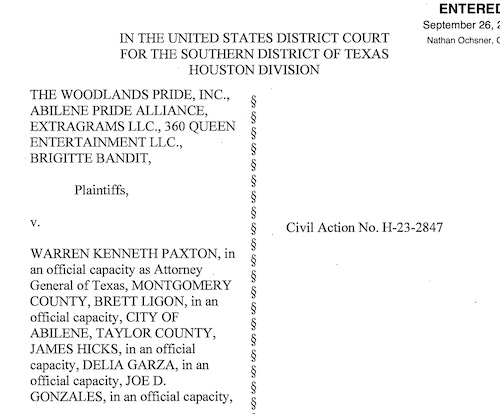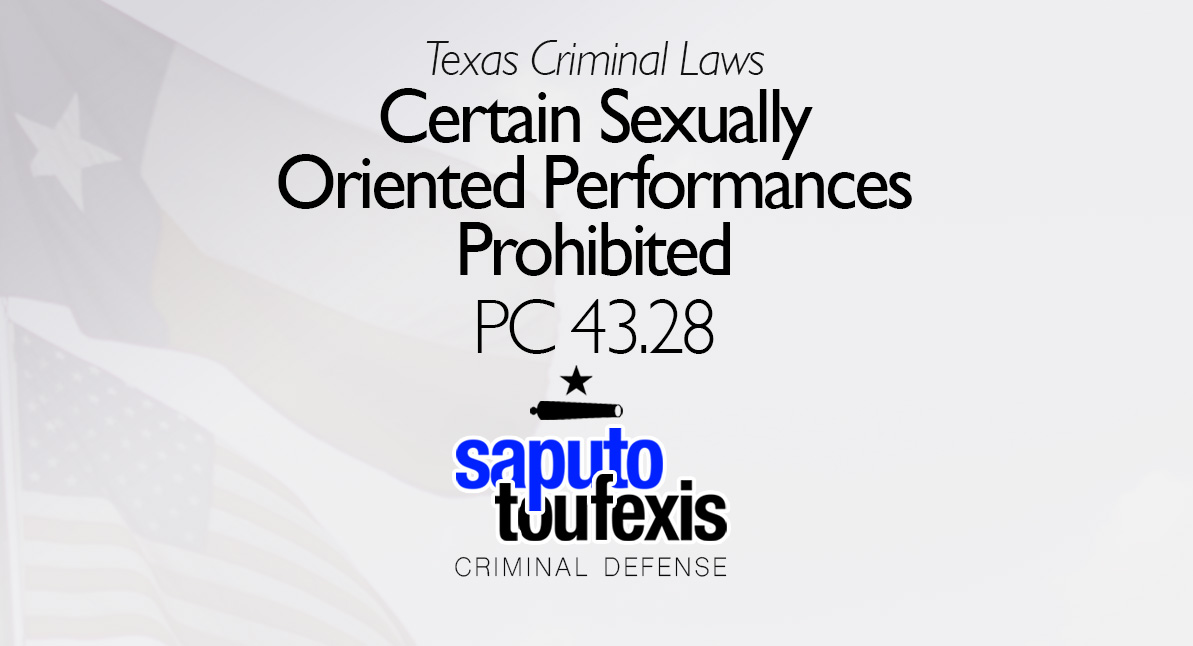The Texas drag show law, Certain Sexually Oriented Performances Prohibited, is the new (for 2023) Texas offense that attempts to ban drag shows, but bans a lot more than just drag shows.
FAQs about the
Certain Sexually Oriented Performances Prohibited law in Texas
- What is the current Texas law about Certain Sexually Oriented Performances Prohibited?
- What is the penalty for a Texas Certain Sexually Oriented Performances Prohibited offense?
- What is the Texas drag show law?
- Is the Texas drag show law constitutional?
- How can I be charged with a Certain Sexually Oriented Performances Prohibited offense in Texas?
- What is the statute of limitations for Certain Sexually Oriented Performances Prohibited in Texas?
- Can you get probation for Certain Sexually Oriented Performances Prohibited in Texas?
- Do I have to register as a sex offender in Texas if guilty of Certain Sexually Oriented Performances Prohibited?
- What level of crime is Certain Sexually Oriented Performances Prohibited in Texas?
In the wake of a sudden legislative interest in regulating gender-conforming behavior, the legislature passed this law making drag show performances a crime in an ostensible effort to stop children from seeing drag shows, but the law casts a much wider and vaguer net – which is a serious problem. This a brand new law for 2023, and it was codified in Texas Penal Code Section 43.28.
The 2023 Texas legislative session was marked by a tremendous amount of political showboating, especially around gender issues related to trans people, mostly to impress conservative voters and establish political bona fides, and this new law is a result of that political gamesmanship. It’s an especially broad law, will rarely if ever be used, and won’t likely stand up in a constitutional challenge without amendment within weeks of passing the legislature, a federal court ruled the law unconstitutional.
Have you been charged with Certain Sexually Oriented Performances Prohibited? Contact us today to discuss legal representation.
or Text or Call (888) 239-9305
Among other things the law prohibits “visual performances” that feature any performers who engage in “the exhibition of sexual gesticulations using accessories or prosthetics that exaggerate male or female sexual characteristics” that “appeals to the prurient interest in sex” on public property or private property where there might be a child. Learn more about the Certain Sexually Oriented Performances Prohibited offense below.
The legislature did not amend this law in 2025.
The Penal Code classifies the Texas Certain Sexually Oriented Performances Prohibited law under Title 9 “Offenses Against Public Order and Decency,” Chapter 43 “Public Indecency.” These “public indecency” crimes are sex crimes, but they are not of a violent or assaultive nature. Learn more about the Texas offense of Certain Sexually Oriented Performances Prohibited below.
What is the current Texas law about Certain Sexually Oriented Performances Prohibited?
AV Preeminent Texas lawyer Paul Saputo provides the current law defining Certain Sexually Oriented Performances Prohibited in Penal Code Section §43.28, as follows:[1]
(b) A person commits an offense if, regardless of whether compensation for the performance is expected or received, the person engages in a sexually oriented performance:
(1) on public property at a time, in a place, and in a manner that could reasonably be expected to be viewed by a child; or
(2) in the presence of an individual younger than 18 years of age.
“Sexually oriented performance” is defined as a visual performance that features: (1) a performer who is nude or (2) any other performer who engages in sexual conduct, and appeals to the “prurient interest in sex.”[2]
As with other laws that are designed to apply to “the prurient interest in sex” – it’s unclear what the prurient interest in sex means.[3] These are common “magic words” that legislators use to mark a distinction without a difference in order to attempt to survive a first amendment challenge. Similarly unclear is what exactly is meant by “the exhibition of sexual gesticulations using accessories or prosthetics that exaggerate male or female sexual characteristics.” It seems like that might apply to dancing with sexy clothes on.
I doubt this will stand up on appeal Within weeks of being signed into law by the governor, a federal judge ruled the law to be unconstitutional.[4] The state will appeal.[5] Expect a decision from the Fifth Circuit in 2024, and perhaps even a Supreme Court ruling in an upcoming term.
This offense was created by the 88th Texas Legislature in 2023,[6] effective September 1, 2023.[7]
What is the penalty for a Texas Certain Sexually Oriented Performances Prohibited offense?
Certain Sexually Oriented Performances Prohibited in Texas is punished as a Class A misdemeanor.[8]
What is the Texas drag show law?
The Texas drag show law is called Certain Sexually Oriented Performances Prohibited, and it is found in Chapter 43 of the Texas Penal Code at Section 43.28.[9] effective September 1, 2023.[10] The law was intended to prohibit drag show performances to minors,[11] but it ends up applying to basically anyone dancing in a sexy manner wearing sexy clothes.
Is the Texas drag show law constitutional?
Shortly after the law was signed by the governor and went into effect, a federal judge in the Southern District of Texas (a Reagan apointee, in fact) held this law banning drag shows in Texas unconstitutional and issued a permanent injunction.[12] Gov. Ken Paxton appealed the ruling to the Fifth Circuit,[13] and regardless of any ruling by the Fifth Circuit, the case will almost certainly be appealed up to the Supreme Court. Take a deeper dive into case that held the law unconstitutional here.
The law has received quite a bit of media attention.[14] No appellate court has made any final determination on the constitutionality of this law, and the appellate litigation will take some time to complete.
I predicted this challenge as soon as this law was signed, and you can see my earlier criticism above.
How can I be charged with a Certain Sexually Oriented Performances Prohibited offense in Texas?
You can be charged with Certain Sexually Oriented Performances Prohibited if the state’s attorneys believe that each of the elements of §43.28 as described in the section above have been met.
What is the statute of limitations for Certain Sexually Oriented Performances Prohibited in Texas?
As a misdemeanor, Certain Sexually Oriented Performances Prohibited charges have a two-year limitations period.[15]
Can you get probation for Certain Sexually Oriented Performances Prohibited in Texas?
The Texas Code of Criminal Procedure allows both judges and juries to grant probation for Certain Sexually Oriented Performances Prohibited, and judges are also allowed to accept deferred adjudication plea deals.[16]
Do I have to register as a sex offender in Texas if guilty of Certain Sexually Oriented Performances Prohibited?
The Certain Sexually Oriented Performances Prohibited offense does not appear on the list of offenses requiring registration under Chapter 62 of the Texas Code of Criminal Procedure.[17]
However, the legislature can add this offense to the list at any time. If that happens, people convicted of Certain Sexually Oriented Performances Prohibited would have to register, even if the offense did not appear on the list at the time they accepted a deferred adjudication plea (even if later dismissed), pled guilty or were found guilty.
What level of crime is Certain Sexually Oriented Performances Prohibited in Texas?
The Penal Code classifies Certain Sexually Oriented Performances Prohibited as Class A misdemeanor
Learn more about the penalty range for this offense in the section above.
Legal References:
^1. Texas Penal Code §43.28. This law is current as of 2025.^2. Texas Penal Code §43.28(a)(1)^3. Prurient interest is undefined in Texas state law, but the term is borrowed from the Supreme Court’s Miller test for obscenity. But none of the accompanied language is present in this law. The Miller test for obscenity includes (1) whether “the average person, applying contemporary community standards” would find that the work, “taken as a whole,” appeals to “prurient interest” (2) whether the work depicts or describes, in a patently offensive way, sexual conduct specifically defined by the applicable state law, and (3) whether the work, “taken as a whole,” lacks serious literary, artistic, political, or scientific value. Miller v. California, 413 U.S. 15, 21, 93 S. Ct. 2607, 37 L. Ed. 2d 419 (1973).^4. See The Woodlands Pride, Inc. et al v. Paxton et al “The Court hereby DECLARES that SB 12 is an UNCONSTITUTIONAL restriction on speech. The Court concludes that SB 12 violates the First Amendment as incorporated to Texas by the Fourteenth Amendment of the United States Constitution. The Court further ORDERS that Defendant Warren Kenneth Paxton, Defendant Montgomery County, Texas, Defendant Brett Ligon, Defendant City of Abilene, Texas, Defendant Taylor County, Texas, Defendant James Hicks, Defendant Delia Garza, Defendant Joe D. Gonzalez are immediately enjoined from enforcing SB 12. (Signed by Judge David Hittner)”^5. Dan Patrick said the bill is “about protecting young children and families. This story is not over.”^6. SB 12, 88th Texas Legislature (RS), Section 3^7. SB 12, 88th Texas Legislature (RS), Section 5^8. Texas Penal Code §43.28(c)^9. Texas Penal Code §43.28, as enacted by SB 12, 88th Texas Legislature (RS), Section 3^10. SB 12, 88th Texas Legislature (RS), Section 5^11. Multiple public statements from officials and legislature explicitly state or strongly suggest that SB 12 was meant to be a ban on drag shows. Lieutenant Governor Dan Patrick said, “it is shocking parents would allow their young children to be sexualized by drag shows” in his official adoption of the Committee report. A Texas state representative made comments expressing his work to “protect children from explicit, hyper-sexual drag performances in Texas. See The Woodlands Pride, Inc. et al v. Paxton et al, p.9^12. See The Woodlands Pride, Inc. et al v. Paxton et al^13. Ken Paxton appeals Texas drag performance law injunction by Will DuPree, KXAN, January 11, 2024^14. Texas law restricting drag performances ruled unconstitutional by federal judge^15. See Code of Criminal Procedure 12.02(a)^16. See Chapter 42A, Texas Code of Criminal Procedure, Art. 42A.054, Art. 42A.056, Art. 42A.102^17. Code of Criminal Procedure, Article 62.001











